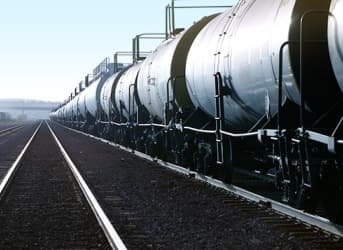Railroad companies fared well last year as the U.S. economy expanded, though how quickly they're able to adapt to transportation rules for oil delivery may determine how well they steam ahead.
Rail operator Genesee & Wyoming reported an 80 percent increase in operating revenue last year on increased traffic. When issuing its first quarter 2014 report May 1, the company said its bottom line was severely impacted by the harsh winter that gripped most of the United States this year.
The company said May 8, however, North American traffic increased 10.8 percent and monthly delivery of petroleum products was up 12.5 percent year-on-year.
There isn't enough pipeline capacity in place to keep up with the increased rate of crude oil production in North America. That's left the rail sector as the primary delivery method of choice in the interim.
The U.S. Department of Transportation issued an emergency order May 7 for rail cars carrying crude oil, specifically from the Bakken reserve area in North Dakota. Operators delivering more than 23,800 barrels of Bakken crude oil, which fits in about 35 tank cars, are required to notify authorities along their route of how much they're carrying and how much traffic is expected.
A CSX Corp. train carrying Bakken crude oil to a refinery in Virginia derailed April 30. Though no injuries were reported, several rail cars caught fire and some of the oil spilled into the James River in Lynchburg, Va.
Related Article: Rail Muscles Its Way into U.S. Oil Boom Narrative
When it announced its first quarter earnings April 15, CSX said operating income declined 16 percent because of the harsh winter. Looking ahead, it said it expects "modest growth" for the year.
Canadian Transport Minister Lisa Raitt ordered thousands of legacy DOT-111 railcars off the Canadian rail system in response to increased accidents involving those cars. Along with its emergency order, U.S. regulators urged Bakken crude oil deliverers to avoid using DOT-111 rail cars "to the extent possible."
BNSF said May 1 it was investing close to $1 billion to overhaul rail capacity along its Northern Corridor, which sees rail running from the Pacific Northwest through North Dakota to Chicago. Carl Ice, the company's president and chief executive officer, said the investment was "critical" given the growing regional demands for rail.
The Association of American Railroads, which described the Canadian order as "aggressive," said railroads companies will "do all they can" to meet the honor the Department of Transportation's orders. Already hammered by a rough winter, and facing the prospects of increased traffic, how well the industry is able to keep up with the quick pace of development could determine their financial future going forward.
By Daniel J. Graeber of Oilprice.com


















